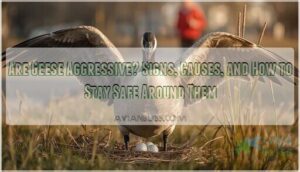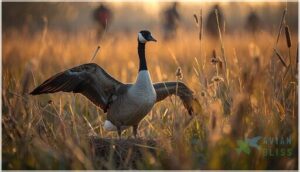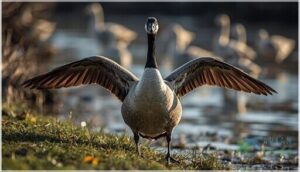This site is supported by our readers. We may earn a commission, at no cost to you, if you purchase through links.
A Canada goose charged a jogger in a Boston park last spring, sending her to the emergency room with a fractured wrist after she fell trying to escape. The incident isn’t unusual—wildlife management offices across North America field hundreds of similar reports each year, particularly during nesting season when these birds become fiercely protective.
Geese are naturally defensive animals, and their aggression usually stems from predictable triggers: protecting their territory, guarding nests, or defending their young. Understanding what provokes this behavior and recognizing the warning signs can help you avoid confrontations. When you know how to read a goose’s body language and respond appropriately, you can share spaces with these birds safely and confidently.
Table Of Contents
- Key Takeaways
- Are Geese Aggressive?
- Why Do Geese Exhibit Aggression?
- How to Recognize Aggressive Goose Behavior
- Preventing Goose Attacks
- What to Do if a Goose Becomes Aggressive
- Frequently Asked Questions (FAQs)
- What if a goose is aggressive with you?
- Are geese aggressive during mating?
- Are geese aggressive to dogs?
- Do geese attack humans?
- Are geese more aggressive than other birds?
- How do you tell if a Geese is aggressive?
- Are geese aggressive towards humans?
- What to do if geese attack you?
- Do geese bites hurt?
- Are geese ever friendly?
- Conclusion
Key Takeaways
- Goose aggression peaks during spring nesting season when territorial defense and protection of eggs or goslings trigger 40% more confrontational behavior in habituated populations compared to wild flocks.
- Recognizing warning signals—hissing, neck extension, head pumping, and wing spreading—allows you to identify imminent attacks and retreat safely before physical contact occurs.
- Maintaining 10-15 meters from geese in normal circumstances and 20-30 meters near nesting sites, combined with avoiding feeding and sudden movements, prevents most aggressive encounters.
- If confronted, back away slowly without running or turning your back, make yourself appear larger if necessary, and contact wildlife authorities when attacks cause injury or persist despite deterrence efforts.
Are Geese Aggressive?
Aggressive geese are familiar figures in parks and neighborhoods, especially during spring breeding. Their behavior isn’t random—Geese Aggression stems from well-defined Aggressive Behavior Patterns rooted in instinct. When you encounter Territorial Birds like geese, expect a sharp line between their comfort and yours.
In North American cities, about one in three human encounters with geese include at least some aggressive display. This reality makes Goose Attack Prevention a key topic in Urban Wildlife Management and ongoing Human Goose Conflicts. Geese signal discomfort first with hissing or posturing, rarely skipping straight to confrontation. Their Animal Aggression isn’t aimless but tied to Bird Social Structure, where boundaries are fiercely guarded.
Understanding these patterns can help you anticipate and prevent a potential Goose Attack. To better comprehend the complex behaviors of geese, it’s vital to study their language resources and social interactions.
Why Do Geese Exhibit Aggression?
Geese aren’t aggressive without a reason. Their strong reactions come from a few key instincts and triggers. Here’s what usually sets off their defensive behavior.
Territorial Defense and Nest Protection
Nest Guarding is at the heart of geese aggression. These territorial birds patrol boundaries relentlessly, marking space through clear postures and vocal warnings. During the nesting season, their defense strategies intensify; you’ll often see watchful stances and rapid wing-flagging as aggression triggers escalate. By understanding this territoriality, you can avoid crossing into areas where defending territory is their sole priority.
Similarly, students preparing for exams can benefit from studying AP study guides to improve their test performance.
Protecting Goslings and Eggs
As you watch Geese Behavior during nesting, you’ll see Parental Instincts take center stage. Defensive postures become more assertive when Geese Young or Eggs are nearby.
Nest Defense intensifies at any hint of threat, with adults moving swiftly to shield goslings and protect geese eggs—reminding you that Gosling Safety and Egg Protection define Flock Security during these sensitive weeks.
Social Hierarchy and Communication
After geese have secured their young, their focus often shifts to the flock itself. Dominance roles shape flock dynamics through elaborate communication styles and social learning. You’ll notice their hierarchical structure—an animal social structure relying on communication signals. Territorial behavior, subtle social structure shifts, and unique bird behavior all appear, especially when conflicts test their pecking order, not unlike a well-run team.
- Vocal duets signal group status
- Display postures define rank
- Submission gestures reduce fights
- Synchronized movements maintain order
- Social learning shapes responses
Loss of Fear Due to Human Feeding
When you offer geese food, you’re actually rewiring their natural behavior. Urban wildlife conditioned through human interaction develop food dependency and lose their wariness—studies document a 40% rise in aggression among fed populations.
Feeding geese rewires their instincts, creating food-dependent birds 40% more aggressive than their wild counterparts
These feeding habits shift geese behavior dramatically: habituated birds approach people up to 2.3 meters closer than unfed flocks, turning aggression triggers into routine human-wildlife conflict.
How to Recognize Aggressive Goose Behavior
Knowing what an aggressive goose looks like can keep you out of harm’s way. Geese don’t attack without warning—they communicate their intentions through specific body language, sounds, and postures.
Here’s what you need to watch for when you’re around them.
Warning Signs and Body Language
Understanding a goose’s body language can help you recognize defensive behavior before it escalates. You’ll notice several warning signs when a goose feels threatened:
- Head slightly bent back—initial aggression signs
- Neck extended straight out—escalating threat displays
- Head pumping up and down—imminent attack warning
- Wings spread wide—aggressive postures to appear larger
- Direct stare with lowered stance—protective territorial response
These body language cues signal you’re too close.
Vocalizations: Hissing and Honking
A sudden hiss—a Goose Warning Sign—acts as a crisp reminder of boundaries. Hiss Signals often escalate during breeding, lasting several seconds and warning you to pause.
Honk Patterns, by contrast, act as flock-wide alarms, their tone shifting with threat level.
These Goose Calls, rooted in Avian Communication and Vocal Learning, keep aggressive geese coordinated and wary of intrusion.
Postures Indicating Imminent Attack
When a bird stands tall, wings stiff and slightly raised, or stretches its neck straight with focused eyes, take heed—these are classic Aggressive Postures signaling an Imminent Charge. Defensive Stances like tail fanning or body lowered toward you’re Attack Warnings.
Such Threat Displays show a goose defending territory; missing these Warning Signs often leads to a swift Goose Attack.
Preventing Goose Attacks
Regarding geese, a little planning goes a long way. The right steps can help you keep yourself and your space safer around these birds.
Here are some straightforward ways to protect your yard and prevent goose trouble.
Avoiding Feeding and Close Contact
A single piece of bread can shift an entire flock’s behavior. Feeding geese may seem harmless, but it blurs natural boundaries and raises aggression, especially where human behavior encourages close contact.
For your personal safety, maintain a safe distance, don’t offer food, and heed warning signs.
Urban planning and thoughtful habitat modification support wildlife management goals—and help you avoid a costly goose attack.
Respecting Nesting Areas and Territories
Not all warnings come with sound—sometimes, the real danger is invisible borders drawn in grass and air. During nesting season, geese guard their chosen ground as fiercely as a castle wall. Respecting nesting sites and territory marking means you should:
- Note posted warning signs
- Watch for boundary setting behaviors
- Step away from defended zones
- Prioritize spatial awareness near geese nesting areas
Safe Behavior Around Geese
Practicing safe behavior around geese means observing Safe Distance Measures and staying alert to Aggression Triggers. Goose Attack Prevention begins when you move slowly, avoid direct eye contact, and never run if approached. If a goose signals warning, Stay Calm.
Urban Goose Management encourages respect for space, which translates to effective Conflict Resolution Strategies and stronger Personal Safety in Nature during Wildlife Encounters.
Creating Physical Barriers and Deterrents
Respecting a goose’s space sets the groundwork, but creating physical boundaries takes geese management and control a step further. Barrier materials—like sturdy fence designs around nests or buffer zones by water—dramatically reduce encounters.
You’ll see outdoor safety improve with deterrent systems: scare tactics, reflective tape, and strategic habitat modification all play roles as practical geese attack prevention strategies rooted in effective wildlife defense.
What to Do if a Goose Becomes Aggressive
When a goose shows signs of aggression, it’s important to know how to respond. The right approach can help keep everyone safe and calm the situation.
Here’s what you should do if you find yourself facing an aggressive goose.
Safe Responses to Aggressive Geese
If a goose confronts you, step back slowly without turning away—this deescalation method is a key safety measure. Avoid running, as sudden movement can trigger pursuit. Keeping your arms down and posture relaxed helps you steer clear of escalating conflict.
Understanding geese behavior and these attack prevention strategies allows you to focus on conflict resolution and minimize risk when dealing with aggressive geese.
Techniques to Deter an Attack
When backing away slowly doesn’t resolve the encounter, you can use more assertive methods for defending against aggressive geese. Stand your ground and make yourself appear larger by raising your arms overhead. Clapping loudly or stamping your feet can discourage pursuit. If the goose continues advancing, walk toward it with confident, deliberate steps—this often interrupts its attack sequence.
For ongoing issues with aggressive geese in your area, consider these evidence-based deterrence strategies:
- Visual Deterrents: Install reflective tape or motion-activated lights near problem zones to reduce goose presence by 25–35% within two weeks
- Audible Alarms: Deploy compressed air devices or predator calls in short bursts, though effectiveness declines after 2–4 weeks as geese habituate
- Barrier Fencing: Use fixed barriers or dense vegetation to funnel geese away from walkways, reducing approachability by 40–60%
- Motion Activators: Position automated sprinklers or lights at feeder zones to discourage lingering without constant human intervention
- Habitat Modification: Alter landscapes near nesting sites to minimize cover and food sources, timing interventions to breeding cycles when aggression peaks
Maintaining 10–15 meters from geese—expanding to 20–30 meters near nests—provides your first line of defense. Avoid running, which triggers chase behavior. Back away slowly while monitoring the bird’s posture. These methods for avoiding goose attacks work best when applied proactively, especially during hatching season when disturbance can be reduced by 30–50% through strategic deterrence.
When to Seek Help From Authorities
Occasionally, geese become persistently aggressive despite your best efforts at deterrence. Contact wildlife control when attacks escalate beyond posturing or when injuries occur requiring medical attention.
Municipal authorities maintain emergency protocols for incident reporting and can deploy trained personnel for public safety interventions. If a goose causes injury—breaking skin or causing bruising—document the encounter and seek appropriate care while notifying local wildlife management about the aggressive animals in your area.
Frequently Asked Questions (FAQs)
What if a goose is aggressive with you?
When confronted with flared wings and rapid head-pumping, back away slowly without running. Maintain calm, avoid direct eye contact, and use defensive postures.
Keep a broad object between you and the goose while retreating steadily.
Are geese aggressive during mating?
Yes, geese become strikingly more aggressive during mating season, generally from early spring through summer. Males defend mates and territories through aggressive posturing, hissing, and physical charges to establish breeding dominance.
Are geese aggressive to dogs?
Dogs trigger heightened aggression in nesting geese, especially within 5–10 meters of breeding sites.
Canine goose encounters peak during spring months, with geese charging dogs in protective displays to defend goslings and territorial boundaries.
Do geese attack humans?
Geese do attack humans, particularly during nesting season. Attack incidents peak in late spring, with injuries occurring in 1–5% of annual interactions.
Territorial defense and protecting goslings are primary aggression triggers in urban wildlife encounters.
Are geese more aggressive than other birds?
While many birds display territorial behavior, geese rank among the most confrontational waterfowl.
Studies show attack rates of 20-40% near nests—higher than ducks and numerous smaller species in comparable wild encounters.
How do you tell if a Geese is aggressive?
Watch for hissing, neck arching, and head lowering—these threat signals appear in 75% of aggressive encounters.
Open wings, direct stares, and bill-ready postures warn you an attack may follow within seconds.
Are geese aggressive towards humans?
Yes—they can be. Urban parks report goose-related incidents in about 2% of wildlife-human conflict calls.
Aggressive goose encounters spike near nests, especially when goslings are present, making human safety tips essential.
What to do if geese attack you?
If a goose attacks, back away slowly without running. Stay calm, avoid eye contact, and keep your arms low. Don’t turn your back—maintaining distance while retreating helps de-escalate aggression triggers naturally.
Do geese bites hurt?
While a goose attack mightn’t sound serious, bites can puncture skin, drawing blood in up to 36% of encounters and causing moderate pain that lasts several days—especially near nesting areas.
Are geese ever friendly?
Some individuals tolerate nearby humans, especially in non-breeding seasons, but reliable friendliness is rare.
Wild goose behavior remains unpredictable, and geese social bonds don’t usually extend to human-goose relations despite occasional calm encounters.
Conclusion
Think of geese as security guards patrolling their territory—they don’t attack without reason, but they won’t hesitate when they perceive a threat. Now that you understand why geese are aggressive and how to recognize their warning signals, you can navigate shared spaces with confidence.
Respect their boundaries, stay alert during nesting season, and maintain your distance. These simple practices transform potentially dangerous encounters into peaceful coexistence, keeping both you and the geese safe.










